Yes, fancy search results with star ratings get all the hype when people talk schema. For good reason… who doesn’t like having stars in their search listings? However, there are many more benefits beyond the obvious ones.
There was a reason that a consortium of top search engines (Google, Microsoft, Yahoo and Yandex) created schema. They believe it will help the search experience so they want your site to use it. In turn, you may get some brownie points from them for implementing it. Brownie points that could lead to some sweet, sweet benefits in search.
These benefits stemming from Schema markup and structured data (we’ll use these interchangeably) are exactly what we’ll cover in this article.
Help search engines understand your site’s content better
Really, we are all just trying to be understood, right? Well that goes for your content, too. I suggest the main goal of SEO is conveying to search engines what your site is about (in legit ways). This is exactly what schema markup was created for.
So the number one reason to use schema is to provide a clearer sense of what your content is about to help search engines surface your content to relevant searchers.
You might be saying…but doesn’t Google know everything? Surely, they must know what my site is about. Sure, with machine learning, the data Google has, etc, it probably has a good idea what your site is about whether it covers sports stats, homemade e-commerce products, or anime fan fiction. But they aren’t 100% sure of every point. Schema is your chance to explicitly tell search engines exactly what your video is about, the salary range of the job you just posted, and what your customer service number is (to take three examples).
Adding schema to your site helps search engines understand what your site is about. This alone really is enough of a reason to use it. But that is just the beginning of the benefits.
Improve brand presence with a full Knowledge Graph
You can provide a strong boost to your brand presence online with Schema. The Knowledge Graph is the big box on the right-hand side of Google desktop searches (or front and center in mobile searches). It has most of the pertinent business information that customers need to know like phone number, social accounts, reviews, etc. The issue is that many businesses don’t have a fully fleshed out knowledge graph, if they have one at all. Google will display knowledge graphs only if they are highly confident the information contained within is accurate and useful. Make it easier for them to trust your company’s information (and thus show a knowledge graph) by marking this info up as structured data on your site. This way you can explicitly provide Google your preferred logo, hours of operation, website link, and more.
Note: Also create and complete your Google My Business account if you haven’t. Here's our SEO Guide to Optimize your Google My Business listing for some tips. This is also a source of information for the Knowledge Graph.
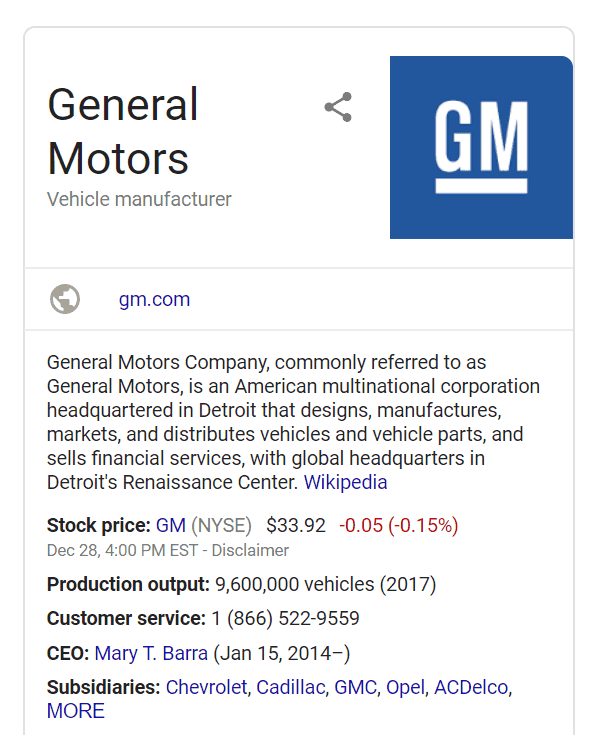
The Knowledge Graph
Get attention-grabbing rich results to increase CTR
Maybe the #1 benefit people seek from Schema is rich results (like the coveted stars). Google is no longer 10 plain blue links on a page. Your search listing can now be pimped out as if Xhibit was your SEO. Rating stars for a movie, product pricing, recipe cook time and more are all now possible to show right in search listings. To get these special listings, add whatever relevant schema you can to your page. Relevant being the operative word (you don’t want to have spammy schema just because you can). There are lots of possible schema types to add (currently Google shows 30 types of rich results powered by schema). Rich results powered by schema make your organic search listings stand out which, in turn, has been shown to increase CTR.
For example, product schema has been shown to increase CTR by 5-10% according to Botify.
Become eligible for SERP features to get more real estate in the SERPs
This benefit is similar to the one above but not exactly the same. Here we are not talking about your organic listing being stylized but instead being featured in a fancy information box (separate and in addition to your organic listing). This could be a top stories carousel, a video carousel, or information table at the top of search to name a few. People often refer to SERP features as Position 0 because they are often on top of even the first organically ranked link. Some don’t like that these "answer boxes" provide an answer right in search that may eliminate a click to your site. I’d recommend trying to win as many SERP features as you can, especially so competitors don't. Unless if its a very simple answer, most will click through to the article to read further. Plus it can be good for brand awareness.
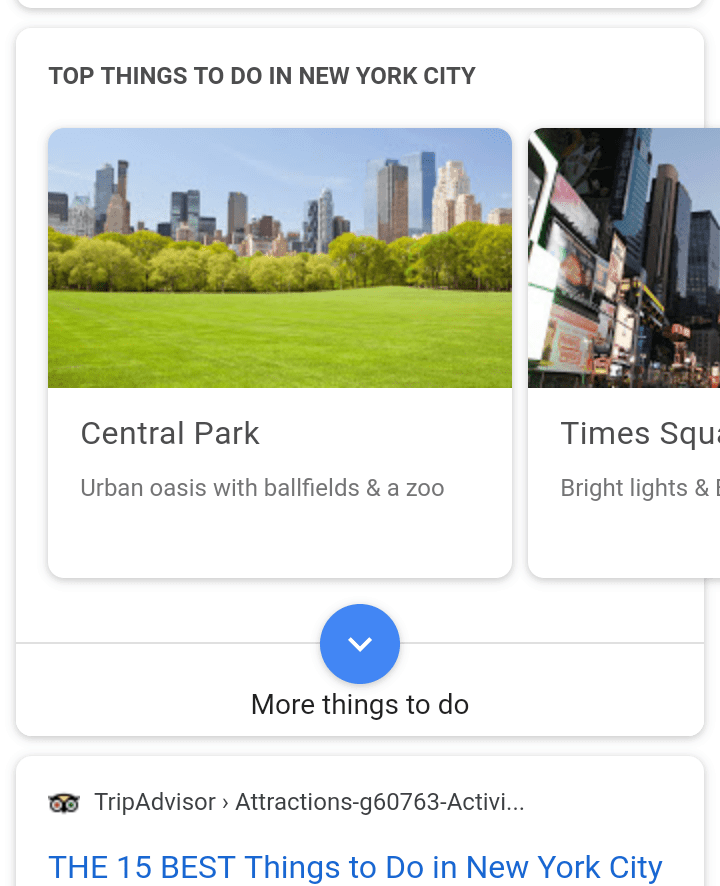
Structured data can increase your odds of showing up in a Top Places list on Google
Improve your ranking position (?)
This one is highly debated (thus the question mark). The official line from Google seems to be that schema is not an official ranking factor. Although Googlers like John Mueller have hinted that schema could help targeting and even ranking for certain terms. Here is the text from a 2018 tweet:
“There’s no generic ranking boost for SD [structured data] usage. That’s the same as far as I remember. However, SD can make it easier to understand what the page is about, which can make it easier to show where it’s relevant (improves targeting, maybe ranking for the right terms). (not new, imo)”
-John Mueller, Senior Webmaster Trends Analyst, Google
My intuition and experiences lead me to the camp believing structured data does improve your ranking (probably indirectly but still that counts). As mentioned in the intro, SEO is all about telling Google what your site’s pages are about in a white hat way. Schema is another legitimate tool in your toolkit that helps tell your story. So use it! Also, it’s clear in some searches (like recipes), search engines heavily favor showing certain marked up listings for sites that include schema. In this case, I think it would be very hard to crack the first page without having the preferred structured data Google wants to include in the results.
Gain a CTA right in the Google Search Results
This is one that a lot of people don’t know about. Certain products can get a “Buy Now” CTA (Call to Action) right in the Google Search Results Page. For example, if you are an author or publisher, you can mark up the product page of your book which makes you eligible for a book listing in Google that includes a Buy Now CTA. Pretty cool!
Note: I have not seen this for any other types of products at this point other than books but I predict more product categories with CTA will be launched in the future.
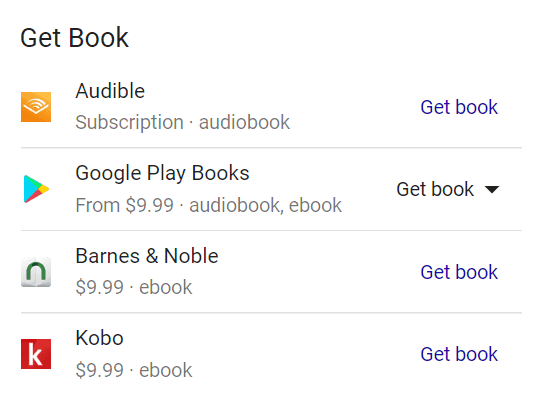
Book schema markup can lead to 'Get Book' Call-to-Actions in Google
Position your site for voice search, Alexa, and Google Assistant
If you read any articles on emerging SEO trends, you’re going to see a lot of people stating that voice search is on the rise. With the proliferation of mobile devices and home speakers, it’s clear why. With voice search results, there is typically only one result provided. So getting to that top position on voice search is even more critical than regular search. Well, thankfully, a lot of the best practices that lead to featured snippets in regular search are the same for voice SEO. One of which is structured data. So use schema to increase your odds of surfacing as the #1 voice search. Also, there is a new speakable schema which is specifically for marking up parts of your site that are meant to be spoken and thus relevant for voice search results.
Non-search sites may use them in some way
Since schema.org is an open source project and source code is widely available, schema markup is essentially public and your pages’ markup can be (and is encouraged to be) used by third party projects many places outside of search. One such example is Pinterest which uses schema markup from a link that you pin in order to create a “rich pin,” similar to a rich result in Google. I predict more creative uses of schema developing in the future.

Rich Pins in Pinterest utilize schema markup of the source link
Provide a sneak preview to your content or site layout in search
Another benefit of schema is that it can provide valuable information to searchers about your site’s content (outside of the main link) which they would otherwise not know. This may make searchers more likely to click. Take the breadcrumb rich result, for example. Subtle, but instead of showing a regular link, it shows categories pages leading up to the page in the familiar breadcrumb style. This provides context to the link and a sense of what your site is about which will increase engagement with relevant people. Similarly, the course rich result powered by structured data also provides a kind of preview into your site by not only showing a breadcrumb but also similar courses on your site. Great if someone is trying to get a little more context before clicking on that link.
Get more job applicants
Additional information boxes (featured snippets) in Google relating to jobs seem to be increasing quickly. Google is taking a larger and more proactive role in getting jobs in front of candidates directly in search. For a job aggregator site, this could be scary new threat. For an employer looking to maximize the number of qualified applicants, this is a big opportunity. To become eligible for those job listings, first mark up your job listing pages with schema and test to make sure it’s correct. Then watch job applications start pouring in so start formulating your interview questions!
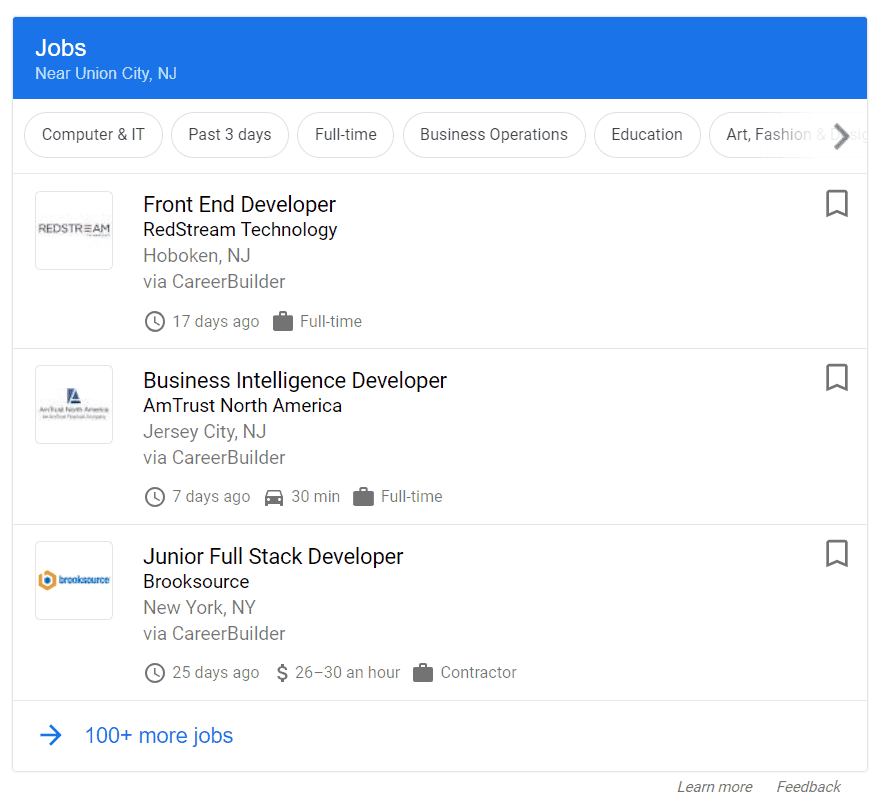
Job Postings are prominently features in SERPs and pull from structured data
Receive more plays of your movie or song
While most featured snippets and rich results help get more clicks to your site, others provide the benefit of encouraging searchers to engaging directly with your media on other sites. Take the media actions schema which is currently in beta, for example. This allows media creators/publishers like songwriters and film makers to offer people the ability to play songs or movies right from Google. So rich snippets are not only about getting more traffic to your site but also about getting more spins of your record.
Get more video views (YouTube, Livestream, or native video)
Similarly, Google could help you directly get more views of your regular videos right from Google, even if the video is not on YouTube, which is Google owned. Marking up your video or upcoming livestream with the correct schema is the first step. Then it becomes eligible to be featured in a video carousel or even a larger single-video snippet. It will also help your chances of being included in the video search results tab.

Livestream structured data results in a 'Livestream' Badge
Display Social Proof in Google
Online interactions are inherently not as trustworthy as dealing with people face to face. That is why social proof, positive signals from unbiased third parties, is huge. We previously mentioned that Google ratings and reviews can show up right in your Knowledge Graph. In addition to that, you can mark up your pages with rating and review information. Maybe you ask readers to rate how helpful a post was. Perhaps you have an e-commerce store that allows customers to leave reviews. This user-generated social proof content can be summarized in structured data and thus eventually included in Google search results. A great way to stand head and shoulders above your competition.
Increase social media following
If you are trying to increase the number of Facebook, Instagram, Twitter followers you have, give schema markup a serious look. By marking up your social accounts using the SameAs schema, you can get the familiar social icons of the top platforms in your Google results with links pointing to your accounts. A great way to build your social following through schema markup.
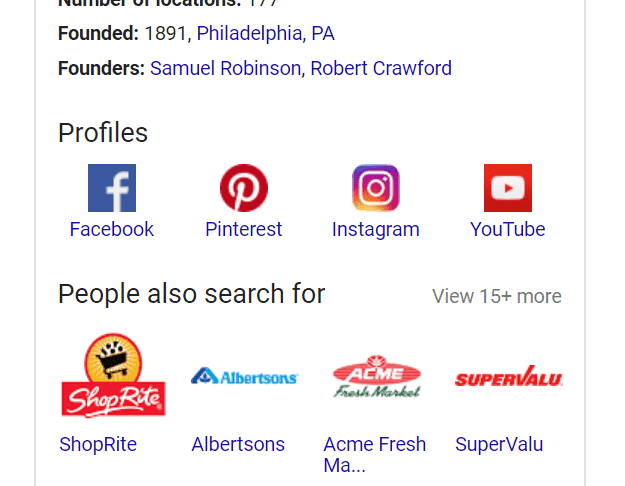
Example of Social Media schema markup up showing in the knowledge graph
Conclusion: Benefits of Schema Markup
In summary, these are fourteen benefits of implementing schema markup on your site:
- Help search engines understand your site’s content better
- Improve brand presence with a full Knowledge Graph
- Get attention-grabbing rich results to increase CTR
- Become eligible for Featured Snippets to get more real estate in the SERPs
- Improve your ranking position?
- Gain a CTA right in the Google Search Results
- Position your site for voice search, Alexa, and Google Assistant
- Non-search engines (like social media) may use them in some way
- Provide a sneak preview to your content or site layout in search
- Get more job applicants
- Receive more plays of your movie or song
- Get more video views
- Display Social Proof in Google
- Increase social media following
Do you know of any more benefits or creative/interesting uses of Schema? If so, leave them in the comments.
